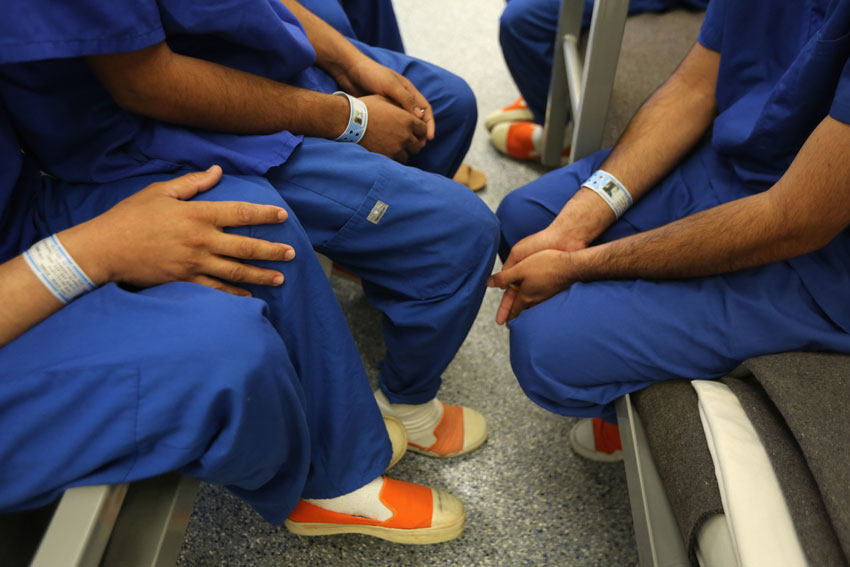Indian Detainees in U.S. Not Handcuffed, Says Volunteer
File photo of Immigration detainees from India sitting in their ‘pod’ at the Immigration and Customs Enforcement (ICE), detention facility on Feb. 28, 2013, in Florence, Arizona. (John Moore/Getty Images)
Over 50 Indian nationals detained in a U.S. prison after they illegally entered into the country are not being handcuffed, a legal advocacy group volunteer who has been meeting the detainees on a regular basis said July 20, writes Lalit K. Jha.
Media reports had claimed that the Indian immigrants, seeking asylum in the U.S. fearing religious and political persecution back home, are being treated like criminals in a federal prison in Oregon where they have been detained for the past several weeks now.
“It was not my statement that immigrants detained at (a federal prison in) Sheridan (Oregon) have been kept in handcuffs and chains since their arrival or that they are in handcuffs and chains 24/7 now. My statement has been misconstrued by the media,” Navneet Kaur, a community college professor, said in a statement.
Kaur who has been volunteering with the Portland-based Innovation Law Lab in providing legal aid to more than 50 Indian prisoners in Sheridan jail said her account is based on her visit to the prison and meetings with these detainees.
Her main role is to provide translation to the detainees, a majority of whom are from Punjab and speak only Punjabi.
“On July 14, 2018, during the 105thyear celebration held in commemoration of the Ghadar Party in Astoria, Oregon, I spoke against the grave violations of human rights experienced by immigrants detained by ICE in America. My statement was based on the accounts I have heard during my visits to the federal detention center in Sheridan, Oregon.
“I gave a few examples of such violations including not giving them access to legal representation, keeping them in prison cells 22 hours a day, keeping them handcuffed and chained for a 24-hour period upon the arrival etc,” Kaur said.
It is her understanding that “conditions” at the federal detention center in Sheridan have improved since the immigrants’ initial arrival in late May 2018, she said
“This was only made possible by coming together of all faith communities and efforts made by Innovation Law Lab attorneys and Public Defenders office,” she said.
Nonetheless, the practice of detaining immigrants is inhumane. Though the men may not be in physical handcuffs and chains now, they are still confined to a prison,” Kaur said.
In a separate statement, APANO’s South Asian Sheridan Support Committee alleged that over 100 migrants are being detained in this prison as a direct result of the Trump administration’s unjust, no exceptions immigration policy.
“Imagine crossing the globe and presenting yourself at the US/Mexico border seeking asylum. And then ending up incarcerated in a federal jail in Sheridan, Oregon. No one speaks your language. You can’t wear a turban, an article of clothing central to your religious practice,” the non-profit organization said in a statement.
“For more than 50 men from India, Nepal, Bangladesh, China and other countries, this is their reality. Fleeing political unrest and gang violence in their home countries, they came to the U.S. seeking safety and protection. And they ended up in a medium security prison,” AAPNO and the South Asian Sheridan Support Committee said.
According to AAPNO all of these men have been offered legal support by lawyers at the Innovation Law Lab and will begin the first step of their asylum hearing, known as the ‘fear assessment,’ this week.
“The bad news is all 121 men currently have deportation orders because of the Trump administration’s violent commitment to detain and deport, these detainees will likely be held at Sheridan even after they pass their fear assessment,” it said.
Meanwhile, an official from the Indian Consulate in San Francisco visited the Sheridan prison to have a first-hand assessment of the condition of Indians detained in the prison.
U.S. Immigration and Customs Enforcement officials in an email to North American Punjabi Association has said that it is processing all detainees in accordance with U.S. immigration law.
“ICE has met with all detainees to advise them of their rights to speak with their consular representatives. Detainees have access to legal representation,” Melissa Nitsch, Community Relations Officer told NAPA.
“Any asylum claims are forwarded promptly to the U.S. Citizenship and Immigration Services (USCIS) asylum office in San Francisco. Interviews are underway by USCIS, and determinations of credible fear are at the discretion of USCIS (not ICE),” Nitsch said.
The Indian Embassy did not respond to questions on how many Indian detainees opted for consular access.


